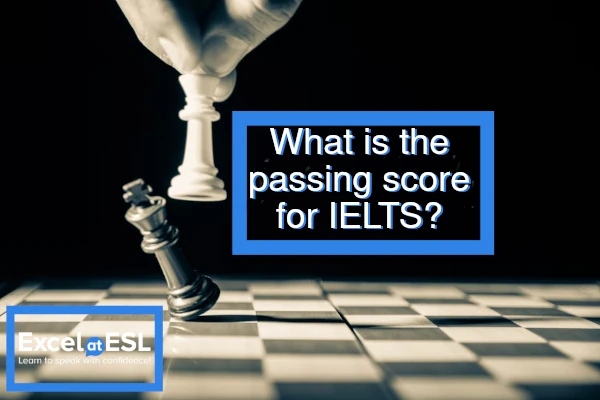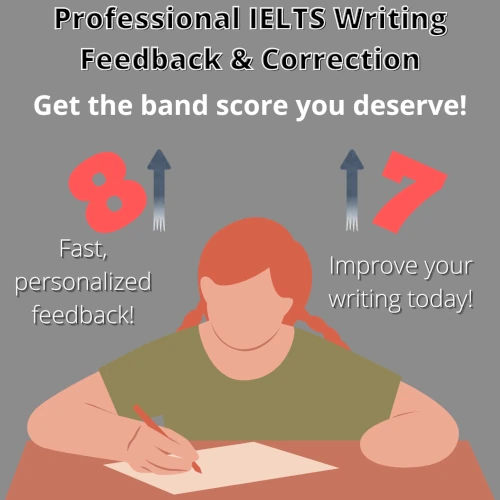Preparing for your IELTS test can be a daunting task. You need to ensure that all of your English skills are polished and improved and that you thoroughly understand the test’s format and expectations. On top of all this, you need to worry about getting a good score! But what does this mean? What exactly is a “good” IELTS score?
There is no passing score for IELTS. The IELTS scoring system is based off of band scores from 1.0 – 9.0. The score you need will depend on how you will use this band score. Most immigration or university programs require between a 6.0 – 8.0 band score.
Table of Contents
The IELTS Band Score System
During the IELTS test, you will conduct one test for each major English language skill: reading, writing, listening, and speaking. You will receive a band score based on your results for each test. These four band scores will be calculated to give you an overall fifth band score.
Depending on the requirements for your desired program, you may need to achieve certain band score levels for either your overall band score or a combination of both the overall and individual band scores. Therefore, there is no explicit passing score for IELTS.
Listening Band Score
The listening test is composed of 40 questions. Depending on your final score, your total of correct answers (each correct answer is one point) is converted into a band score. The scores are in whole or half points.
| Listening Band Score | Total Points Required |
|---|---|
| 5 | 16 |
| 6 | 23 |
| 7 | 30 |
| 8 | 35 |
Want to improve your listening band score? Check out my article “Improve Your IELTS Listening Today with 7 Easy Tips”.
Reading Band Score
Much like the listening test, the reading test is scored out of 40 points. Depending on your total numerical score (each correct answer is one point), you will receive a calculated band score. It will be scored in either whole or half points.
Depending on your final goal, you will either take the academic or general IELTS reading test. The content of these tests is slightly different due to the differing goals of candidates. The general test is for people who wish to live and work in an English language environment, while the academic test is geared towards those who will take post-secondary or graduate courses in English.
| Academic Reading Band Score | Total points Required |
|---|---|
| 5 | 15 |
| 6 | 23 |
| 7 | 30 |
| 8 | 35 |
| General Reading Band Score | Total Points Required |
|---|---|
| 4 | 15 |
| 5 | 23 |
| 6 | 30 |
| 7 | 34 |
| 8 | 38 |
Want to improve your academic band score? Check out my article “Improve your IELTS Academic Reading Today with 5 Easy Tips”.
Writing Band Score
The writing test is evaluated based off your performance. There is no point system for this test. Instead, your writing is graded based on certain criteria set forth by the IELTS organization. The writing test consists of two separate tasks. Your band score is based off your performance on each. Task 2 will count towards your final score twice as much as task 1.
The expectations are the same for both the academic and general writing tests, although the content is different between each.
Writing Task 1
There are four major marking criteria for task 1:
- Task achievement
- Coherence and cohesion
- Lexical resource
- Grammatical range and accuracy
Want to understand how to write IELTS academic writing task 1? Check out my in depth article here.
| Band Score | Task achievement | Coherence and cohesion | Lexical resource | Grammatical range and accuracy |
|---|---|---|---|---|
| 6 | • addresses the requirements of the task • (A) presents an overview with information appropriately selected • (GT) presents a purpose that is generally clear; there may be inconsistencies in tone • presents and adequately highlights key features/bullet points but details may be irrelevant, inappropriate or inaccurate | • arranges information an ideas coherently and there is a clear overall progression • uses cohesive devices effectively, but cohesion within and/or between sentences may be faulty or mechanical • may not always use referencing clearly or appropriately | • uses an adequate range of vocabulary for the task • attempts to use less common vocabulary but with some inaccuracy • makes some errors in spelling and/or word formation, but they do not impede communication | • uses a mix of simple and complex sentence forms • makes some errors in grammar and punctuation but they rarely reduce communication |
| 7 | • covers the requirements of the task • (A) presents a clear overview of main trends, differences or stages • (GT) presents a clear purpose, with the tone consistent and appropriate • clearly presents and highlights key features/bullet points but could be more fully extended | • logically organizes information and ideas logically • manages all aspects of cohesion well •uses a range of cohesive devices appropriately although there may be some under/overuse | • uses a sufficient range of vocabulary to allow some flexibility and precision • uses less common lexical items with some awareness of style and collocation • may produce occasional errors in word choice, spelling and/or word formation | • uses a variety of complex structures • the majority of sentences are error-free • makes only very occasional errors or inappropriacies |
| 8 | • covers all requirements of the task sufficiently • presents, highlights and illustrates key features/bullet points clearly and appropriately | • sequences information and ideas logically • manages all aspects of cohesion well • uses paragraphing sufficiently and appropriately | • uses a wide range of vocabulary fluently and flexibly to convey precise meanings • skillfully uses uncommon lexical items but there may be occasional inaccuracies in word choice and collocation • produces rare errors in spelling and/or word formation | • uses a wide range of structures • the majority of sentences are error-free • makes only very occasional errors or inappropriacies |
Writing Task 2
The scoring criteria for task 2 are:
- Task response
- Coherence and cohesion
- Lexical resource
- Grammatical range and accuracy
Want to understand how to write IELTS academic writing task 2? Check out my in depth article here.
| Band Score | Task response | Coherence and cohesion | Lexical resource | Grammatical range and accuracy |
|---|---|---|---|---|
| 6 | • addresses all parts of the task although some parts may be more fully covered than others • presents a relevant position although the conclusions may become unclear or repetitive • presents relevant main ideas but some may be inadequately developed/unclear | • arranges information and ideas coherently and there is a clear overall progression • uses cohesive devices effectively, but cohesion within and/or between sentences may be faulty or mechanical • may not always use referencing clearly or appropriately • uses paragraphing, but not always logically | • uses an adequate range of vocabulary for the task • attempts to use less common vocabulary but with some inaccuracy • makes some errors in spelling and/or word formation, but they do not impede communication | • uses a mix of simple and complex sentence forms • makes some errors in grammar and punctuation but they rarely reduce communication |
| 7 | • addresses all parts of the task • presents a clear position throughout the response • presents, extends and supports main ideas, but there may be a tendency to over-generalize and/or supporting ideas may lack focus | • logically organizes information and ideas; there is clear progression throughout • uses a range of cohesive devices appropriately although there may be some under/overuse • presents a clear central topic within each paragraph | • uses a sufficient range of vocabulary to allow some flexibility and precision • uses less common lexical items with some awareness of style and collocation • may produce occasional errors in word choice, spelling and/or word formation | • uses a variety of complex structures • the majority of sentences are error-free • makes only very occasional errors or inappropriacies |
| 8 | • sufficiently addresses all parts of the task • presents a well-developed response to the question with relevant, extended and supported ideas | • sequences information and ideas logically • manages all aspects of cohesion well • uses paragraphing sufficiently and appropriately | • uses a wide range of vocabulary fluently and flexibly to convey precise meanings • skillfully uses uncommon lexical items but there may be occasional inaccuracies in word choice and collocation • produces rare errors in spelling and/or word formation | • uses a wide range of structures • the majority of sentences are error-free • makes only very occasional errors or inappropriacies |
Want to improve your academic writing band score? Check out my article “Improve your IELTS Academic Writing Today with 10 Easy Tips”.
Speaking Band Score
The speaking test is the same for both academic and general test candidates. Like the writing test, there is no point system for the speaking test. Instead candidates are evaluated on four major criteria. Each are equally weighted and averaged to produced the final band score.
- Fluency and coherence
- Lexical resource
- Grammatical range and accuracy
- Pronunciation
| Band Score | Fluency and coherence | Lexical resource | Grammatical range and accuracy | Pronunciation |
|---|---|---|---|---|
| 6 | • is willing to speak at length, though may lose coherence at times due to occasional repetition, self-correction or hesitation • uses a range of connectives and discourse markers but not always appropriately | • has a wide enough vocabulary to discuss topics at length and make meaning clear in spite of inappropriacies • generally paraphrases successfully | • uses a mix of simple and complex structures, but with limited flexibility • may make frequent mistakes with complex structures, though these rarely cause comprehension problems | • uses a range of pronunciation features with mixed control • shows some effective use of features but this is not sustained • can generally be understood throughout, though mispronunciation of individual words or sounds reduces clarity at times |
| 7 | • speaks at length without noticeable effort or loss of coherence • may demonstrate language-related hesitation at times, or some repetition and/or self-correction • uses a range of connectives and discourse markers with some flexibility | • uses vocabulary resource flexibly to discuss a variety of topics • uses some less common idiomatic vocabulary and shows some awareness of style and collocation, with some inappropriate choices • uses paraphrasing effectively | • uses a range of complex structures with some flexibility • frequently produces error-free sentences, though some grammatical mistakes persist | • shows all the positive features of band 6 and some, but not all, of the positives features of band 8. |
| 8 | • speaks fluently with only occasional repetition or self-correction; hesitation is usually content-related and only rarely to search for language • develops topics coherently and appropriately | • uses a wide vocabulary resource readily and flexibly to covey precise meaning • uses less common idiomatic vocabulary skillfully, with occasional inaccuracies • uses paraphrasing effectively as required | • uses a wide range of structures flexibly • produces a majority of error-free sentences with only very occasional inappropriacies or basic/non-systematic errors | • uses a range of pronunciation features with mixed control • shows some effective use of features but this is not sustained • can generally be understood throughout, though mispronunciation of individual words or sounds reduces clarity at times |
Overall Band Score
As we already discussed, the IELTS test is evaluated using a 1.0 – 9.0 band score system. Candidates go through each of the four testing sections and are given a band score for each based on certain criteria. Each score level corresponds to an equivalent level of English.
| Band Score | Skill level |
|---|---|
| 9 | Expert user |
| 8 | Very good user |
| 7 | Good user |
| 6 | Competent user |
| 5 | Modest user |
| 4 | Limited user |
| 3 | Extremely limited user |
| 2 | Intermittent user |
| 1 | Non-user |
| 0 | Did not attempt the test |
How is the overall score calculated?
Your overall score is the average of the four test scores. The final score is rounded to the nearest whole or half band score depending on the number after the decimal (.25 – .74 is rounded to .5 and .75+ is rounded up to the nearest whole).
Example Band Score Calculations
| Listening Score | Reading Score | Writing Score | Speaking Score | Average Score | Overall Score | |
|---|---|---|---|---|---|---|
| John | 7.0 | 8.0 | 5.5 | 6.0 | 6.625 | 6.5 |
| Mary | 6.0 | 5.5 | 5.5 | 6.0 | 5.75 | 6.0 |
| Mark | 4.0 | 3.0 | 3.0 | 3.5 | 3.375 | 3.5 |
| Susan | 8.0 | 8.0 | 6.5 | 5.0 | 6.875 | 7.0 |
Scores are valid for up to two years after you take your test. Be sure to submit your applications within this time frame or you will have to retake the IELTS test.
What Score Do I Need?
The score you need will depend on your goals. Some countries or institutions require higher scores than others. The best way to figure out what band score you need is to check the website of the university you want to attend or the government website of the country you want to emigrate to.
To give you an idea of various band score requirements, you will find some tables below with countries and famous universities along with their band score requirements.

Academic IELTS
The following are band score requirements for various institutions in Canada, the USA, the UK, and Australia. You can use these requirements to develop an understanding of what band score you might need for your own goals. Each institution has its own requirements. You should consult the program you want to join directly for your own requirements.
Canada
| Institution | Band Score Requirements |
|---|---|
| University of Toronto | 6.5 (minimum 6.0 for each test) |
| McGill University | 6.5 |
| McMaster University | 6.5 (minimum 6.0 for each test) |
| University of Waterloo | 6.5 (6.5 writing, 6.0 reading, 6.0 listening, 6.5 speaking) |
| University of British Columbia | 6.5 (minimum 6.0 for each test) |
United States of America
| Institution | Band Score Requirements |
|---|---|
| Cornell | 7.5 or above |
| Yale | 7.0 or above |
| Duke | 7.0 |
| UCLA | 7.0 or above |
| Columbia | 7.5 |
United Kingdom
| Institution | Band Score Requirements |
|---|---|
| Oxford | 7.0 – 7.5 (minimum 6.5 – 7.0 for each test) |
| University of Edinburgh (depends on program) | 6.5 (minimum of 5.5 for each test) (MA Ancient History and Latin) |
| Imperial College London | 6.5 – 7.0 (minimum 6.0 – 6.5 for each test) |
| King’s College London | 6.0 (minimum 5.5 for each test) |
| University of Manchester (depends on program) | 5.5 – 7.5 or above |
Australia
| Institution | Band Score Requirements |
|---|---|
| Australian National University | 6.5 – 7.0 (minimum 6.0 – 7.0 for each test) |
| University of Sydney | 6.5 (minimum 6.0 for each test) |
| University of Melbourne | 6.5 (minimum 6.0 for each test) |
| University of Queensland | 6.5 (minimum 6.0 for each test) |
| University of Adelaide | 6.5 (minimum 6.0 for each test) |
General IELTS
The following are various band score requirements for immigration to Canada, the USA, the UK, and Australia. You can use the information below to understand what band score requirements might be like for your situation. Each country has its own requirements. You should consult the immigration websites of the country you hope to emigrate to.
| Country | Band Score Requirements |
|---|---|
| Canada (higher score grants points) | 6.0 – 9.0 (minimum 6.0 for each test) |
| USA (non-IELTS test given by the government required for citizenship) | N/A |
| UK | 4.0 – 8.5 (various minimum requirements) |
| Australia (depends on visa type) | 6.0 (minimum 6.0 for each test) |
How to Improve my Score?

Now that you have a better understanding of the band score you need. How do you get it? Improving your IELTS band score is a two step process:
- Improve your English abilities.
- Understand the test format and expectations.
Luckily for you, I’ve written a huge article dedicated to helping you maximize your IELTS band score. Check out “How to get a high score in the IELTS test” here!
Get Professional Help
Studying by yourself can work out great, but it can be difficult. You need to juggle the competing demands of improving your English skills and studying for the test. There’s a lot to know!
That’s where a professional language coach can be a big help. An IELTS tutor not only knows the test inside and out, but also knows how to prepare candidates just like you for test day. With a good private language coach, you have someone in your corner dedicated to your success.
I’ve taught and guided hundreds of IELTS candidates just like you to achieving their goals. If you want patient, professional, and personalized help, click one of the images below to learn more information about my writing correction and feedback or language coaching services.





